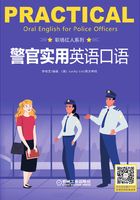
Unit 4 Rescue Operations 救助
Verbal directions in English are imperative for Chinese police officers when rescuing foreigners injured in accidents, suffering acute diseases or stuck in disasters such as a fire or an earthquake.
When rescuing an injured English-speaking foreigner, police officers have to find out, by questioning in English, which part of the body is injured and how bad it is, and, if possible, help to stop bleeding, bind up the wound, and/or fix the possibly fractured or a broken part of the body before sending the injured to hospital.
When rescuing an English-speaking foreigner suffering a sudden occurrence of a serious disease such as a heart attack, police officers, if conditions permit, must take any necessary measures to prevent the disease from deteriorating while calling for an ambulance or waiting for a doctor.
When rescuing English-speaking foreigners stuck in a fire or an earthquake, police officers should, in correct and clear English, keep orders, calm them down, and tell them how to protect themselves and where and how to evacuate.
In any case, inform the victim's family members and the consulate or embassy concerned as soon as possible.
中国警察在遇到外国人意外受伤、突发急病、遭受火灾、地震等险情危胁时,使用英语口头指令非常重要。
救助讲英语的伤员时,应首先使用英语询问受伤部位及伤势,根据现场条件适当止血、包扎、固定可能骨折的部位,然后送往医院。
救助讲英语的急重病人(如心脏病发作病人)时,如条件允许,应采取措施避免病情恶化,同时叫救护车或请医生。
救助在火灾或地震中受困的讲英语的外国人时,警察应该使用清楚明白的英语维持秩序、安定情绪、宣传自我救护方法、指明撤离路线和方法。
不管属于上述哪种情况,都要尽快通知被救助外国人的家属和领事馆(大使馆)。